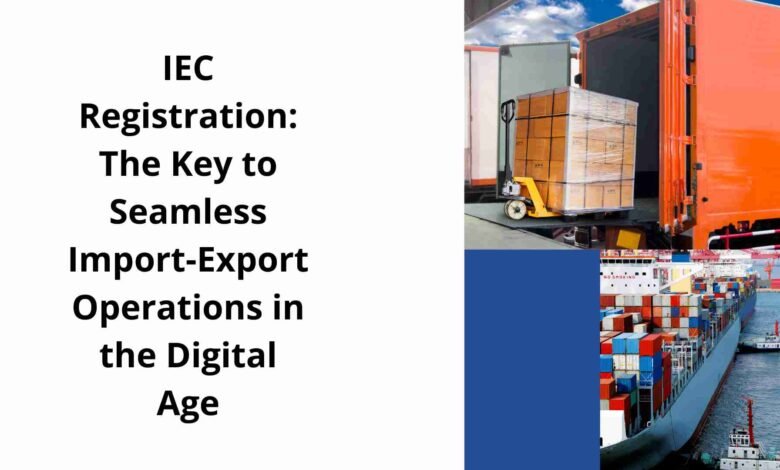
IEC registration short for Importer Exporter Code registration, is a unique 10-digit code issued by the Directorate General of Foreign Trade (DGFT), under the Ministry of Commerce and Industry, Government of India. It is a mandatory requirement for businesses or individuals engaged in import and export activities in India.
The IEC serves as a form of identification for businesses or individuals involved in international trade transactions. It is used to track and monitor cross-border movements of goods, regulate foreign trade, and facilitate compliance with various regulatory frameworks governing import-export operations.
Legal Requirement:
First and foremost, IEC registration is a mandatory requirement for businesses engaged in import and export activities in India. It serves as a unique identification number issued by the Directorate General of Foreign Trade (DGFT), under the Ministry of Commerce and Industry, Government of India.
Facilitates Customs Clearance:
IEC registration, businesses can smoothly navigate through customs procedures. It enables customs authorities to track and monitor international trade transactions, ensuring compliance with regulatory frameworks and facilitating faster clearance of goods at ports of entry and exit.
Access to International Markets:
IEC registration opens the doors to global markets, allowing businesses to explore and capitalize on international trade opportunities. Whether it’s sourcing raw materials from overseas suppliers or exporting finished goods to foreign buyers, having an IEC enhances the credibility and trustworthiness of your business in the eyes of international partners.
Enables Easier Transactions:
In today’s digital age, most import-export transactions are conducted online. Having an IEC facilitates seamless electronic filing of documents and online transactions through platforms like the DGFT’s e-commerce portal. It streamlines the process of obtaining licenses, permits, and benefits under various export promotion schemes, thereby reducing paperwork and administrative hassles.
Promotes Growth and Expansion:
By obtaining IEC registration, businesses can position themselves for growth and expansion into new markets. It fosters innovation, competitiveness, and diversification by providing access to a wider customer base and a diverse range of suppliers and partners across the globe.
Ensures Compliance with Regulatory Standards:
IEC registration ensures that businesses adhere to regulatory standards governing international trade. It helps in maintaining transparency and accountability in cross-border transactions, thereby mitigating the risk of legal and financial repercussions associated with non-compliance.
Enhances Credibility and Trustworthiness:
Having an IEC enhances the credibility and trustworthiness of a business in the eyes of international stakeholders. It signals to foreign partners, customers, and regulatory authorities that the business is legitimate, reliable, and committed to conducting its operations under established trade practices and regulations.
Facilitates Access to Finance and Insurance:
Many financial institutions and insurance companies require businesses to have an IEC as a prerequisite for availing trade finance facilities and insurance coverage for international transactions. IEC registration serves as proof of the business’s legitimacy and eligibility for such financial services, thereby facilitating access to capital and risk management solutions.
Enables Participation in Government Schemes and Incentives:
Businesses with IEC registration are eligible to participate in various government schemes and incentives aimed at promoting exports, boosting manufacturing, and fostering economic growth. These schemes may include export promotion schemes, duty drawback programs, export credit guarantees, and other financial incentives offered by the government to support export-oriented businesses.
Supports Digital Transformation and Innovation:
IEC registration aligns with the broader objectives of digital transformation and innovation in international trade. By enabling electronic filing of documents, online communication with regulatory authorities, and integration with digital trade platforms, IEC registration contributes to the modernization and efficiency of global supply chains, making them more resilient, agile, and responsive to evolving market dynamics.
Streamlines Supply Chain Management:
IEC registration plays a vital role in streamlining supply chain management processes for businesses engaged in import-export operations. By providing a standardized identification number, it facilitates seamless tracking and tracing of goods across various stages of the supply chain. This transparency and traceability enable businesses to optimize inventory management, reduce lead times, and enhance overall operational efficiency.
Expedites Foreign Investments:
For businesses looking to attract foreign investments or establish strategic partnerships with international stakeholders, having an IEC can be instrumental. It demonstrates the business’s commitment to engaging in cross-border trade and signifies its readiness to collaborate with global investors, suppliers, and customers. This, in turn, can expedite the process of securing foreign investments, fostering technology transfer, and driving innovation within the business ecosystem.
Enables Market Expansion Strategies:
IEC registration empowers businesses to implement effective market expansion strategies by providing access to valuable market intelligence and trade data. With an IEC in hand, businesses can conduct market research, identify emerging trends, and evaluate new market opportunities with greater precision and confidence. This strategic insight enables businesses to tailor their product offerings, pricing strategies, and marketing efforts to meet the unique demands of target markets, thereby maximizing their chances of success in international trade.
Strengthens Risk Management Practices:
In an increasingly interconnected and volatile global economy, effective risk management is essential for safeguarding businesses against unforeseen disruptions and uncertainties. IEC registration contributes to strengthening risk management practices by facilitating compliance with regulatory requirements, enhancing visibility into cross-border transactions, and enabling proactive risk mitigation strategies. Whether it’s managing currency fluctuations, geopolitical risks, or supply chain disruptions, businesses with an IEC are better equipped to anticipate and respond to potential threats, thereby safeguarding their interests and preserving their competitive advantage in the marketplace.
Note: You can also Apply for IEC Code Renewal
Fosters Collaboration and Networking:
Finally, IEC registration fosters collaboration and networking opportunities within the global business community. By joining trade associations, participating in industry events, and leveraging digital platforms, businesses can connect with like-minded professionals, share best practices, and explore collaborative opportunities for mutual benefit. These connections and collaborations not only enhance the business’s knowledge base and expertise but also open doors to new partnerships, alliances, and business ventures that can fuel growth and innovation in the long run.
Conclusion:
In conclusion, IEC registration is not just a regulatory requirement but a strategic enabler that empowers businesses to thrive in the digital age of global trade. From facilitating seamless supply chain management to expediting foreign investments, enabling market expansion strategies, strengthening risk management practices, and fostering collaboration and networking, IEC registration plays a multifaceted role in driving the success and sustainability of businesses engaged in import-export operations. By recognizing the significance of IEC registration and leveraging its benefits effectively, businesses can position themselves for growth, resilience, and prosperity in today’s interconnected and dynamic global marketplace.



